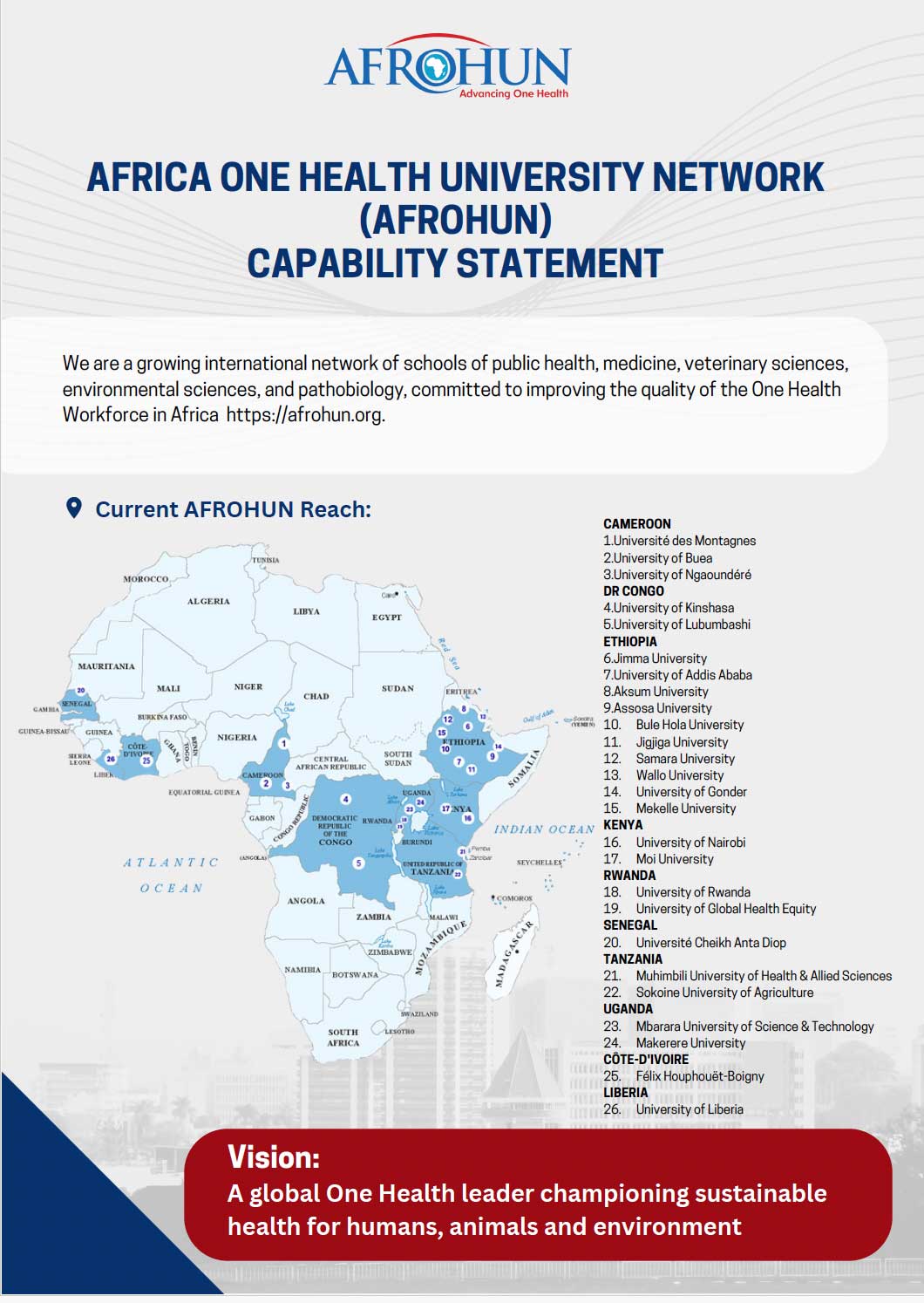WELCOME TO AFRICA ONE HEALTH UNIVERSITY NETWORK
AFROHUN
Africa One Health University Network (AFROHUN).
About Us
The Genesis
As Africa One Health University Network (AFROHUN), we have our roots in the Leadership Initiative of Public Health in East Africa (LIPHEA) and the Health Alliance, which were spearheaded by Makerere University School of Public Health (MakSPH) in Uganda, in collaboration with Muhimbili University of Health and Allied Sciences (MUHAS), School of Public Health in Tanzania since 2005; all established with support from USAID.
Inspired by the evolution of the One Health concept and philosophy, LIPHEA invited schools of veterinary medicine in the region to join hands in the formation of OHCEA, which was inaugurated on 17th October 2010. It all started with seven schools of public health and seven faculties of veterinary medicine in DRC, Ethiopia, Kenya, Rwanda, Tanzania and Uganda.
The focus was initially on disaster preparedness and response, but later there was need to address One Health Workforce (OHW) strengthening in Africa, which was addressed under the umbrella of the USAID Emerging Pandemic Threats (EPT) program.
The initial geographic focus was East and Central Africa but the network expanded to embrace west African universities in Senegal, and is still growing.
Our Work
The network is working to transform the training environment and approaches in universities, in a bid to develop a workforce without disciplinary barriers. Enabling students to understand and appreciate the contribution of disciplines outside their own; in predicting, detecting and responding to the kind of complex health challenges we are witnessing today. This is the next generation workforce that we need in the face of increasing outbreaks of epidemics, pandemics and complex health challenges.
To achieve this transformation, we are reviewing curricula, designing new and exciting experiential learning multidisciplinary training programs, re-tooling teachers and trainers, educating communities on existence and transmission of zoonotic and infectious diseases, while engaging national and sub-national governments to integrate One Health into national policy and strategic planning.
The Future
The network leadership (Board and Summit) acknowledges the increasing demand for the network to promote One Health Workforce development services in member countries and on the continent. In 2019, network leaders resolved to expand the network’s mandate from a regional to a continental agenda to ensure inclusivity. Furthermore, it notes that this expansion would enable the network contribute to the broader vision of securing, protecting and promoting the health of the continent holistically. The leaders also noted the increasing interest by funding agencies and potential partners to support university networks, including in parts of the continent where the network is not currently operating.
Responding to this continental shift, the Board and Leadership Summit overwhelmingly agreed to change the name of the network from One Health Central and Eastern Africa (OHCEA) to Africa One Health University Network (AFROHUN).
The work we have done, over the years, has positioned us as a convening platform for institutions of higher education interested in using the One Health approach in building the next generation practitioner. AFROHUN is now taking on a bigger and expanded mandate to cover the entire continent, reflecting the name.
The change triggers:
- Growing need to expand to other parts of the continent:
There is increasing demand for the network to promote One Health Workforce development services in member countries and on the continent. This would enable the network contribute to the broader vision of securing, protecting and promoting the health of the continent holistically. There is also increasing interest by funding agencies and potential partners to support university networks, including in parts of the continent AFROHUN is not operating in, currently.
- Need to expand the network’s scope of engagement:
Focusing on multi-level engagement for building One Health workforce and capacity. This is at national level, sub-national level and the community. We are also expanding beyond the traditional One Health disciplines and institutions of public health and veterinary medicine. We are bringing on board agriculture, forestry, wildlife, veterinary and public health paraprofessionals, and allied health professionals, business, anthropology and technical and vocational training institutions.
- Connecting with the outside world:
Network operations in the last 10 years have been largely in the university. However, the network is at a point of growth where we have started looking at our role in influencing society beyond the university. We have become more proactive in identifying changing needs, and working with others to design adaptive programs. Health challenges are becoming more complex, therefore, needing more comprehensive contextualized strategies and interventions. The One Health landscape is expanding and more key players coming on board, many of whom are engaged in work that complements what we do. There is need to work together to synergize efforts and processes, and learn from each other. We are starting to engage a number of other players including; policy makers, private sector, businesses, civil society, and communities. Having strengthened understanding of and capacity for One Health within the network membership, we are moving to influence agenda beyond the university.
- Affirming our Niche: The past ten years have allowed the network to build proof of concept in One Health education and training. It is now timely for the network to consolidate its key achievements into high impact activities, especially with a clear focus contributing to change. The AFROHUN One Health Workforce Academy offers such opportunities where structured programs and trainings will be incubated, piloted and rolled out to users. This is also, an opportunity for Universities to provide leadership in “One Health Workforce Development”.

